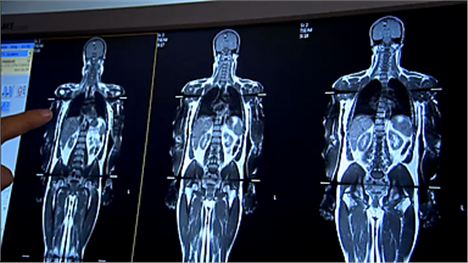IN the second half of this BBC documentary presenter Jacques Peretti analysed the rise and repercussions of the ‘supersize revolution’ and how our relationship with food has been deliberately restructured over the past forty years in a way that’s overwhelmingly detrimental to our diets.
The lack of advice for the individual in the documentary, coupled with the overwhelming evidence that we are at the mercy of both our biology and food companies, is as likely to lead to apathy and resignation as it is to a positive change in lifestyle.
If the man principally blamed for our expanding waistlines in last week’s show was Secretary of Agriculture Earl Butz, this week’s eponymous villain was David Wallerstein. As head of confectionary sales at a chain of cinemas Wallerstein became the pioneer of the idea that if we are given the option of more we will invariably take it. McDonalds headhunted Wallerstein and in 1972 the first large fries went on sale, a pivotal moment in the history of food sales.
Considering the accusatory tone of the documentary’s title, both men were portrayed in a sympathetic light. Their actions were depicted as being made in innocence and their effects on our waistlines were shown as purely accidental. The suggestion was these men were simply given the task of raising company profits and found innovative ways of doing so.
Butz and Wallerstein could never have predicted the massive ramifications of their contributions to food. What is troubling is, despite the explosion in obesity and the undeniable evidence linking junk food to the problem, very little has changed with regards to company responsibility. Figureheads from various institutions over both parts of the documentary hid behind phrases such as ‘customer value’ and ‘responsible eating’.
Furthermore, companies continue to claim their newest products were the result of a demand from the customer. Included in this claim are the relatively new ‘share sized’ items which are the perfect size for a singular binge and are predominantly eaten in this way. Interestingly this expedient is shown to have filtered down to the most domestic types of businesses. A diner owner in Great Yarmouth claimed the ‘Kidz Breakfast’ (so called because it is the size of a small child) was introduced because people kept complaining the biggest breakfast wasn’t big enough.
The scientific elements of the show built upon last week’s focus on the intoxicating nature of our modern food and our susceptibility to its charms. One particularly shocking experiment showed how rats would never overeat when given a diet of rat food but immediately started gaining weight when given the types of food we like. The reason for this is rats, like us, are biologically programmed to stock up on calories for times of scarcity. Professor Anthony Sclafani, head of this research, described the modern world as a ‘toxic food environment’ where we are constantly surrounded by foods we are biologically inclined to consume.
As in last week’s episode the scientific research was shown to be directly in conflict with big businesses and that scientists are largely losing the battle against obesity. In this second part Peretti directed his attention towards British businesses revealing the difficult task scientists faced in limiting advertising junk food to children. Similarly, research showing inactivity to be insignificant in causing obesity when compared to a bad diet, had its funding withdrawn in 2005 and is yet to be completed.
When Peretti spoke with Andrew Opie of the British Retail Consortium he, for the first time, seemed on the verge of productively confronting one of his interviewees over the duplicity systemic to big businesses. Peretti spoke of the “lip service” paid by supermarkets who sign pledges to help fight obesity whilst promoting multi-buy offers for junk food. Through this, Peretti revealed a vitriol which could have been employed against many of the people he had previously interviewed.
An uncommon moment of optimism, and an indication of the magnitude of the problem, came towards the end of the documentary with the discussion of a tax on unhealthy foods in America, Land of the Free Market. Dr Kelly Brownell from the Rudd Centre for Food Policy and Obesity at Yale University predicted a repeat of what happened with the tax on tobacco when companies initially won legal battles but eventually were beaten. “My belief is the industry knows this will occur and is just trying to fight it off for as long as they can” he stated.
The second part of this show effectively re-emphasised some of the issues from the first section. Most importantly in showing the domination companies exert over scientists and exposing how trends in America continue to impact diets at home (although an investigation into why the UK is so vulnerable to American influence could be a fruitful line of inquiry). Furthermore the scientific studies covered in the programme provided additional concrete evidence that compound the view that the obesity problem is not an individual one.
What is worrying, is the lack of useful solutions offered by the show short of reprimanding the companies responsible. On the blog for the programme, Peretti writes that we should ‘opt to cook from scratch’ and that ‘sharp bursts of sprinting’ burn off internal fat however this was never related in the show. The lack of advice for the individual in the documentary, coupled with the overwhelming evidence that we are at the mercy of both our biology and food companies, is as likely to lead to apathy and resignation as it is to a positive change in lifestyle.
The last section of the documentary airs next Thursday at nine o’clock and focuses on the hidden dangers of health foods. The topic seems to present the best opportunity for Peretti to properly challenge the representatives he interviews. It would also be logical for advice on weight loss to appear at the closing of the documentary. If both of these additions appear they will raise The Men Who Made Us Fat from being an intriguing if slightly ineffective piece of television to an important documentary on one of the most pressing issues of our time.














